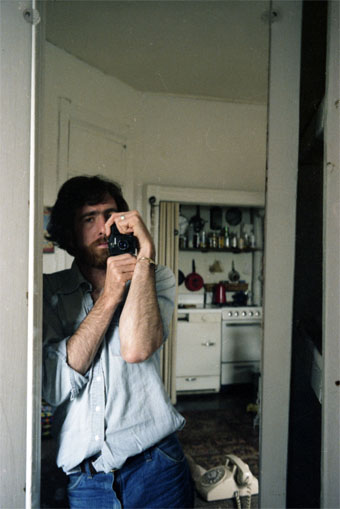“Ross McElwee’s Photographic Memory is organized into three untidy acts,” notes Joseph Jon Lanthier in Slant, “each of them summed up in a poor man’s kōan via voiceover narration: ‘I love my son, but sometimes he drives me crazy,’ ‘What happened to film?,’ and, finally, ‘How did I get to be this old?’ True to form, however, McElwee’s peripatetic reflections allow for so much drift between these hackneyed guideposts that his occasional collisions with cliché feel startlingly genuine and dolorously inevitable.”
Noel Murray at the AV Club: “One advantage of Ross McElwee’s film-everything/edit-later methodology is that whenever he wants to reflect on his life and family—which is pretty much what he’s done for the last 30 years—he has the clips to back up any story he wants to tell. That’s what makes McElwee’s latest feature-length documentary, Photographic Memory, so quietly devastating. He was inspired to make the film by his strained relationship with his now-grown son Adrian, whom McElwee worries is too distracted by technology and partying to follow through on his many creative ideas. So to understand his son better, McElwee decides to revisit his own early 20s, when he was a hippie free spirit with a fiddle, a notebook, and a camera, kicking around France having romantic adventures and worrying his father, a successful North Carolina surgeon. As McElwee returns to Brittany to track down the photographer he apprenticed with—and as he struggles to stay in touch with Adrian—he revisits the films and videotapes he has of his son, of his own father, and of a life that keeps slipping by and changing before he can get a handle on what’s happening.”
“That investigative process for lost acquaintances is echoed by his mournful ruminations on the discrepancies between film and digital photography,” notes Nick Schager in the Voice, “with the former cherished for the physical connection it created with memories, and yet which has been made archaic by a current techno landscape that, in its hyper-connectivity, seems to have distanced McElwee even further from Adrian. Alternating between time periods and geographic locations, all of it connected by McElwee’s narrated thoughts, the film proves a bracing and sometimes uncomfortable peek into private fears and regrets about mortality and missed opportunities. It’s also, in its portrait of wayward Adrian, further proof that there’s nothing more difficult, frustrating, messy, and insufferable than teenagerdom.”
At Sundance NOW, Anthony Kaufman sets Photographic Memory next to Alan Berliner‘s First Cousin Once Removed, which has just premiered at the New York Film Festival: “While Berliner, an inveterate New Yorker, and McElwee, a Southerner turned Harvard transplant, examine life through different personal lenses and styles, the two directors can be considered fathers of a particular form of subjective-style personal documentary that arose in the late 1980s. McElwee’s seminal verité work Sherman’s March: A Meditation on the Possibility of Romantic Love in the South during an Era of Nuclear Weapons Proliferation, released in 1986, wryly reflects on his own personal exploits, while Berliner’s unique found-footage driven films Intimate Stranger (1991) and Nobody’s Business (1996) address the nature of family and legacy through engagements with the filmmaker’s own relatives…. Berliner, 56, and McElwee, 65, find themselves asking similar questions about time and its passing.”
“McElwee’s quietly reassuring voice dominates the film, but that doesn’t mean he can’t craft a magnificently eloquent image when he wants to,” writes Matt Singer in Time Out New York.
“If you know McElwee, you know he has a genius for making the personal universal,” writes Time Out Chicago‘s Ben Kenigsberg. For the Reader‘s J.R. Jones, this is “an act of self-reckoning quite unlike anything else in recent documentary filmmaking.”
John Anderson profiles McElwee in the New York Times.
Update, 10/18: Ed Champion interviews McElwee.
For news and tips throughout the day every day, follow @KeyframeDaily on Twitter and/or the RSS feed. Get Keyframe Daily in your inbox by signing in at fandor.com/daily.




